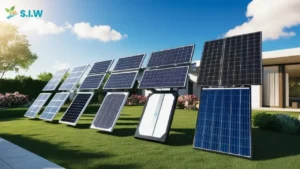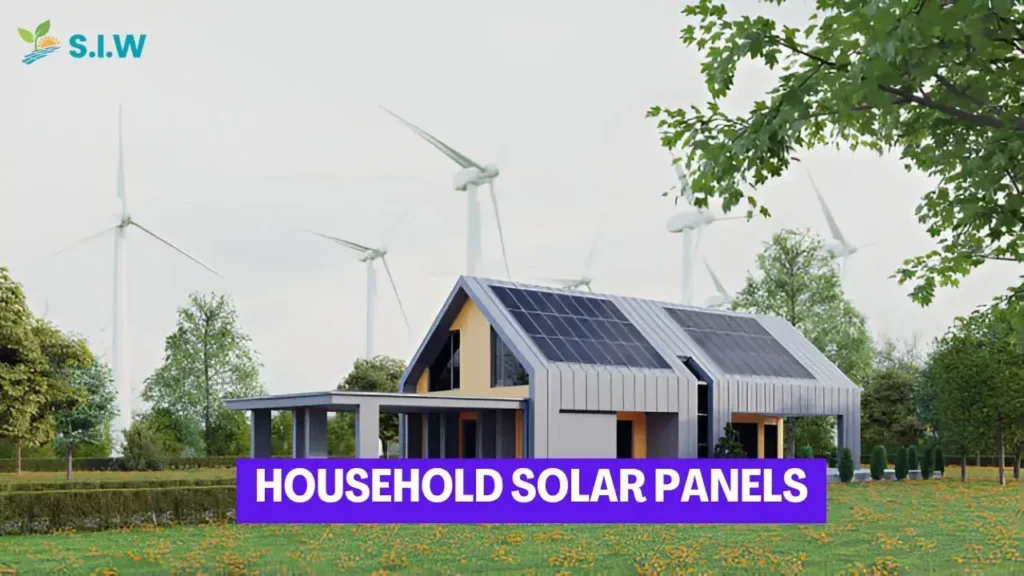The Rise of Solar Power in Households
The demand for sustainable and renewable energy sources has never been higher. As households strive to reduce their carbon footprint and save on electricity bills, solar panels have emerged as a leading solution. This article delves into everything you need to know about household solar panels, including their benefits, types, installation process, costs, and maintenance. Whether you’re a homeowner looking to make the switch or just curious about the technology, this guide will equip you with the knowledge to make an informed decision.
What Are Household Solar Panels?
Household solar panels, also known as photovoltaic (PV) panels, convert sunlight into electricity. This clean, renewable energy source can power everything in your home, from lights and appliances to heating systems. Solar panels are typically installed on rooftops, where they can capture maximum sunlight exposure, making them a popular choice for residential energy solutions.
How Do Solar Panels Work?
Photovoltaic Effect
Solar panels are made up of numerous solar cells, usually composed of silicon. When sunlight hits these cells, it creates an electric field that generates a direct current (DC) of electricity.
Inverter Conversion
The DC electricity generated by the solar panels is converted into alternating current (AC) electricity by an inverter, which is the standard form of power used in homes. This process ensures that the energy produced is compatible with household appliances and the grid.
Energy Storage and Usage
Excess energy produced during sunny days can be stored in batteries for use during cloudy days or at night. Some systems also allow households to sell surplus power back to the grid, further offsetting electricity costs.
Benefits of Installing Solar Panels at Home
Reducing Electricity Bills
One of the most immediate benefits of solar power system for homes is the significant reduction in electricity bills. By generating your own power, you rely less on the grid, resulting in lower monthly expenses.
Environmentally Friendly
Solar energy is a clean, renewable resource that produces no greenhouse gas emissions during operation. By switching to solar, households contribute to a reduction in fossil fuel consumption, helping combat climate change.
Energy Independence
Solar panels provide energy independence by reducing reliance on traditional energy providers. This is particularly valuable in areas prone to power outages or where energy costs are volatile.
Increasing Property Value
Homes equipped with solar panels often see an increase in property value. Buyers are willing to pay more for homes with pre-installed solar systems, viewing them as a long-term investment that reduces future utility costs.
Low Maintenance Costs
Solar panels require minimal maintenance, making them a hassle-free energy solution. Regular cleaning and occasional inspections are usually sufficient to keep the system running efficiently for decades.
Types of Household Solar Panels

Monocrystalline Solar Panels
Monocrystalline panels are known for their high efficiency and sleek design. Made from a single crystal structure, they perform well in low-light conditions and have a longer lifespan compared to other types.
Polycrystalline Solar Panels
Polycrystalline panels are made from multiple silicon crystals, making them slightly less efficient than monocrystalline panels but more affordable. They are a popular choice for homeowners looking to balance cost and performance.
Thin-Film Solar Panels
Thin-film panels are lightweight and flexible, making them suitable for unconventional installations where traditional panels might not fit. While less efficient, they are often used in spaces with ample roof area.
Bifacial Solar Panels
Bifacial panels capture sunlight on both sides, increasing energy production. They are ideal for locations with reflective surfaces, such as near water bodies or snow-covered areas.
How to Choose the Right Solar Panels for Your Home
Assess Your Energy Needs
Before purchasing solar panels, it’s important to assess your household’s energy needs. Review your electricity bills to determine your average usage, which will help you estimate the size and number of panels required.
Roof Suitability
Evaluate your roof’s orientation, pitch, and available space. South-facing roofs with minimal shading provide the best conditions for solar panels. Structural integrity should also be checked to ensure the roof can support the panel weight.
Budget Considerations
Solar panel costs vary widely based on type, efficiency, and brand. Set a budget that includes installation, inverters, and any additional equipment like batteries. Keep in mind that government incentives and tax credits can significantly reduce the overall cost.
Warranty and Lifespan
Most solar panels come with a 25-year performance warranty, guaranteeing efficiency over time. Consider panels with longer warranties and a proven track record for durability and performance.
The Installation Process: What to Expect

Site Assessment
A professional solar installer will conduct a site assessment to evaluate the best placement for your panels, considering factors like roof orientation, shading, and structural integrity.
System Design
Based on the assessment, the installer will design a system tailored to your energy needs and roof configuration. This includes choosing the right panels, inverters, and mounting equipment.
Permits and Approvals
Installing solar panels requires permits and approvals from local authorities and utility companies. Your installer will handle the paperwork, ensuring compliance with all regulations.
Installation
The actual installation typically takes a few days, depending on the complexity of the system. Panels are mounted on the roof, inverters are connected, and the system is integrated with your home’s electrical grid.
Inspection and Activation
Once installed, the system undergoes inspection to ensure it meets safety and performance standards. After approval, the system is activated, and your home starts generating solar power.
Cost of Installing Solar Panels
Upfront Costs
The upfront cost of solar panels includes the price of the panels, inverters, batteries (if included), and installation. On average, homeowners can expect to pay between $10,000 and $30,000, depending on the system size and type of panels.
Financing Options
Several financing options are available, including solar loans, leases, and power purchase agreements (PPAs). These options allow homeowners to install solar panels with little to no upfront cost and pay over time.
Incentives and Rebates
Government incentives, such as the federal solar tax credit, can significantly reduce the cost of installing solar panels. State and local rebates may also be available, further lowering the financial barrier to entry.
Long-Term Savings
While the initial investment in solar panels can be substantial, the long-term savings on electricity bills often outweigh the upfront costs. Many homeowners see a return on investment within 7-10 years.
Maintaining Your Solar Panels
Regular Cleaning
Dust, leaves, and debris can reduce the efficiency of solar panels. Regular cleaning with water and a soft brush can keep the panels performing optimally.
Annual Inspections
An annual inspection by a professional can identify any issues with wiring, inverters, or panel performance. Early detection of problems ensures the system remains efficient and safe.
Monitoring Systems
Many solar systems come with monitoring software that allows you to track energy production in real-time. This helps identify any drops in performance that may indicate maintenance needs.
Common Myths About Household Solar Panels
Myth 1: Solar Panels Don’t Work on Cloudy Days
While solar panels are most efficient in direct sunlight, they still generate power on cloudy days, albeit at a reduced capacity. Modern panels are designed to maximize energy capture in various weather conditions.
Myth 2: Solar Panels Are Too Expensive
The cost of solar panels has decreased significantly over the past decade, and with available incentives, they are more affordable than ever. Additionally, the long-term savings on energy bills can offset the initial investment.
Myth 3: Solar Panels Require Constant Maintenance
Solar panels are low-maintenance, with most systems requiring only periodic cleaning and inspections to ensure optimal performance.
Myth 4: Solar Panels Damage Your Roof
Properly installed solar panels can protect your roof by shielding it from the elements. Installations are designed to prevent leaks and other structural issues.
Future of Solar Panels: Innovations and Trends
Advancements in Solar Technology
Emerging technologies, such as solar shingles and transparent solar panels, are pushing the boundaries of traditional solar energy solutions. These innovations offer new ways to integrate solar power into homes without compromising aesthetics.
Integration with Smart Home Systems
Modern solar panels can be integrated with smart home systems, allowing homeowners to monitor and control energy usage more efficiently. This integration maximizes the benefits of solar energy while enhancing overall home automation.
Growing Popularity of Energy Storage
Battery storage systems, such as Tesla’s Powerwall, are becoming increasingly popular, allowing homeowners to store excess energy for use during peak hours or power outages. This enhances energy independence and provides backup power when needed.
Is Solar Power Right for Your Home?
Solar panels offer a multitude of benefits, from reducing electricity bills to contributing to a cleaner environment. While the initial investment can be significant, the long-term advantages make it a worthy consideration for many households. By assessing your energy needs, budget, and roof suitability, you can determine if solar panels are the right choice for your home. With ongoing advancements in technology and increasing accessibility, solar power is set to become a staple in household energy solutions.
If you’re considering making the switch to solar, getting a quote is a crucial first step. We provide comprehensive services to help you understand the costs, savings, and benefits specific to your home. Contact us today to get a quote for household solar and start your journey towards a sustainable energy solution.








